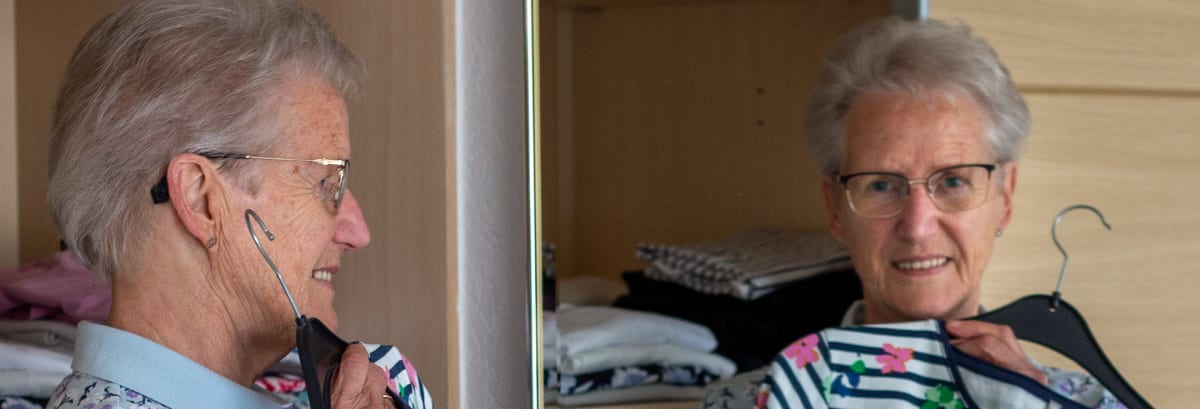Portrait Series on Reablement: “In Care, We Often Want to Be Too Kind”
Published on: 29-11-2024
With reablement, you work on the autonomy and self-reliance of older adults. But how do you best support clients in regaining their independence? How do you, as a care professional, get used to working more ‘with your hands behind your back?’ In this portrait series, we take you along care organizations that apply reablement in practice. Today, we give the floor to a community nurse from ZuidOostZorg.
Why do you think working on self-reliance is important?
"Focusing on reablement also brings a certain level of respect. People want to do things independently; it makes them feel useful. I often think, 'How would I feel if people constantly came into my home to help me?' You no longer feel like you live on your own as a person. I often discuss this with people. We often say, 'I understand you,' but that’s not entirely true. I understand it to a certain extent. 'Why don’t you tell me more about it?' is a better conversation starter. That conversation is more important than providing physical care. It’s about: ‘How does the person feel?’”
We often say, 'I understand you,' but that’s not entirely true. I understand it to a certain extent. 'Why don’t you tell me more about it?' is a better conversation starter. That conversation is more important than providing physical care. It’s about: ‘How does the person feel?'
What do you encounter in practice?
"One of our clients is a lady who really enjoyed us doing everything for her. At some point, we had a conversation with her about how she could start taking her medication herself again. She got angry. I then sat with her for a while and asked why she was angry. She told me she was afraid we wouldn’t come at all anymore. I assured her that wasn't the case. I also asked, 'What makes you reluctant to try using the Medido (medication dispenser)?' This led to a conversation, after which she agreed to use the Medido. The key is to get to the core of why someone wants or doesn't want to do something. If this lady can eventually do everything by herself, we still want to offer her a sounding board."
Often we want to be too kind. A volunteer also visits this lady, takes time for her, and offers support in decision-making. Often we want to be too kind to someone. Certain patterns then creep in, making it harder to discuss them. By having the conversation, we find solutions to form new patterns and increase independence.
How do deal with time in reablement?
"How much time you need can differ with the same person. No two days are alike, and I take that into account. For example, for someone with dementia, putting on socks takes more time, but they get the chance to do it themselves. If you want people to do things themselves, you have to give them the space to do so. If I need more time, I simply take it. I trust I’ll make up the time later. Sometimes I might be a bit late for the next client, but I tell them, 'If I’m with you and you need something extra, you hope I stay a bit longer too.' "
"Still, I sometimes miss the trust in community nursing: we know it costs money and needs to be organized in a certain way. I know how to do this best and can always justify it."
If you want people to do things themselves, you have to give them the space to do so.
How do you stimulate self-reliance?
"A lady called me to ask if we could help her brother with showering. We couldn't find a medical reason for assisting with showering. She hadn’t yet discussed it with her brother because she found it difficult. So, I suggested we discuss it together with the three of us. I had a mediating role in that conversation. Eventually, she expressed her concerns and offered to help her brother with a few small tasks. Then I could step out of the conversation, and they continued together. This request from the lady didn’t take me much time: 30 minutes for the phone call with her, 30 minutes for a home visit with her brother, and 15 minutes for a follow-up call to see how things were going."
What did you do to keep your hands behind your back?
"I repeatedly asked the sister why she wanted us to help her brother with showering. It quickly became clear it was also about her concerns for her brother living alone. I also asked her, 'Do you understand my side too?' We want to help as many people as possible who really need us. I also make sure to keep asking myself, 'Do I really need to do this?' It requires a different mindset, where I still invest in supporting people. For instance, when the brother asked his sister, 'Do you think I smell bad?' The sister didn't know what to say for a moment, so I kept the conversation going."
My cleanliness may not be someone else's. People are sometimes messy and live like that. It’s far more important to have a conversation: 'What do you really need?'
How do you deal with resistance?
"For example, we have a lady who can do everything herself, but her daughter thinks otherwise. I start with simple things, like using eye drop glasses. I show how they work. Sometimes it goes wrong with the glasses, but that happens without them too. I also explain in the intake conversation that there is a need to do things differently. Especially with people who have been in care for years, there needs to be more attention and explanation about why this is important."
How do you work on self-reliance with your team?
"I explain to my colleagues that some clients find using technology difficult, but we still need to work with it. It’s important to discuss this kindly with clients. For example, you can say, 'Give it a chance, we’ll guide you on how to do it’. Sometimes, you conclude that you won't help someone with the toilet anymore, but will support them in how to do it themselves. I hear colleagues say, ‘Yes, but I don’t know what to say then.' And you can guide your colleague in that too."
What tips do you have for colleagues?
“Take the time and space to give people the chance to do things themselves. Take the time you think is necessary. In the end, it will pay off. Initially, it takes more time, then less. Reflect on why you’re doing something for people. Let go of the set time. We are not all the same, so the time needed varies per person.”
About Reablement
Older adults are staying at home longer and want to manage as much as possible by themselves. ‘Reablement’ has become a popular topic in the Dutch elderly care sector in recent years. Some people think reablement is nothing new. They see it as a new name for something that has long existed. Others view it as a wonderful, modern development. But everyone agrees that reablement contributes to person-centered and life-oriented care. With reablement, you work on the autonomy, self-management, and self-reliance of older adults.
About the Portrait Series
In the Portrait Series on Reablement, we take you along care organizations that translate reablement into their practice.






